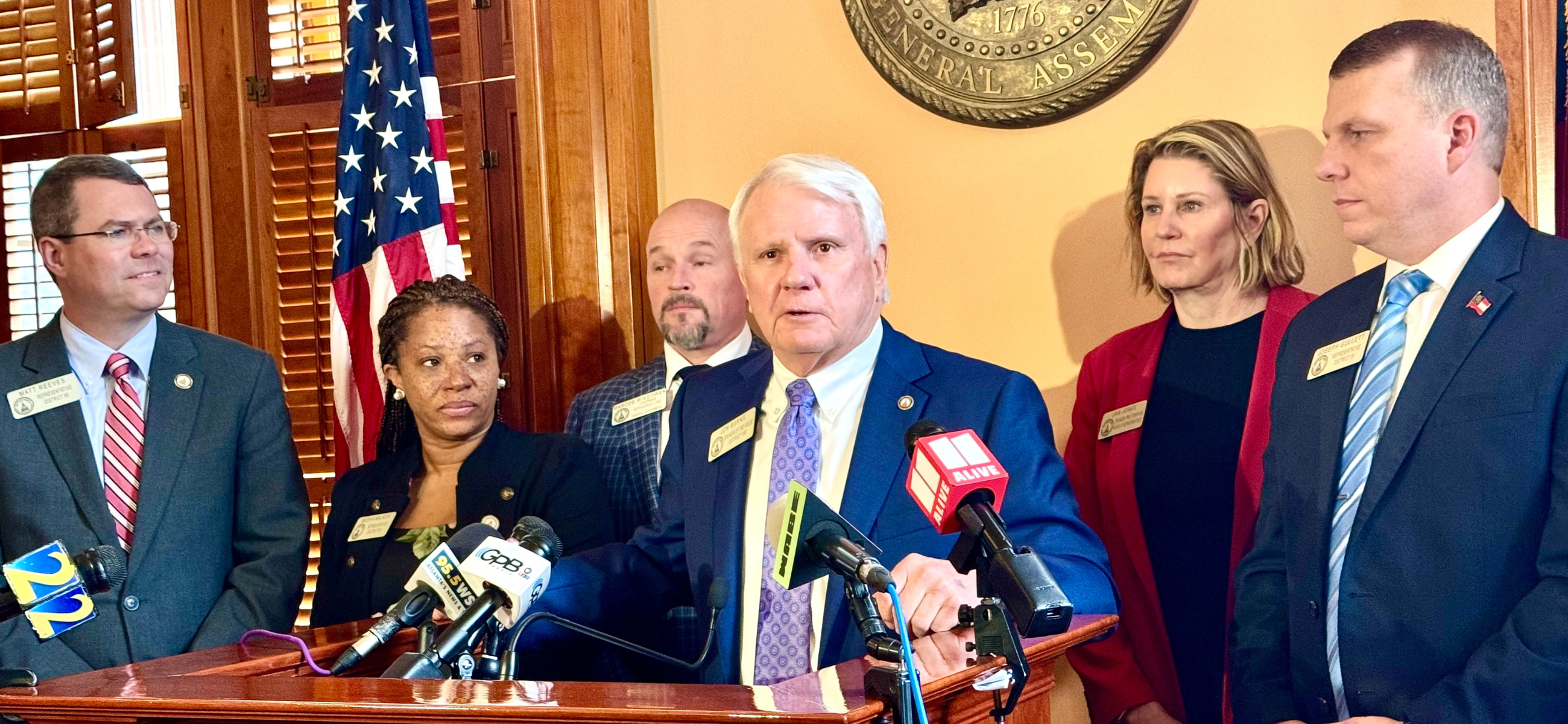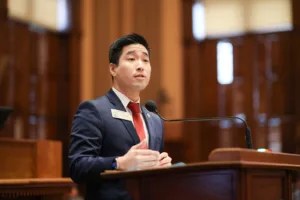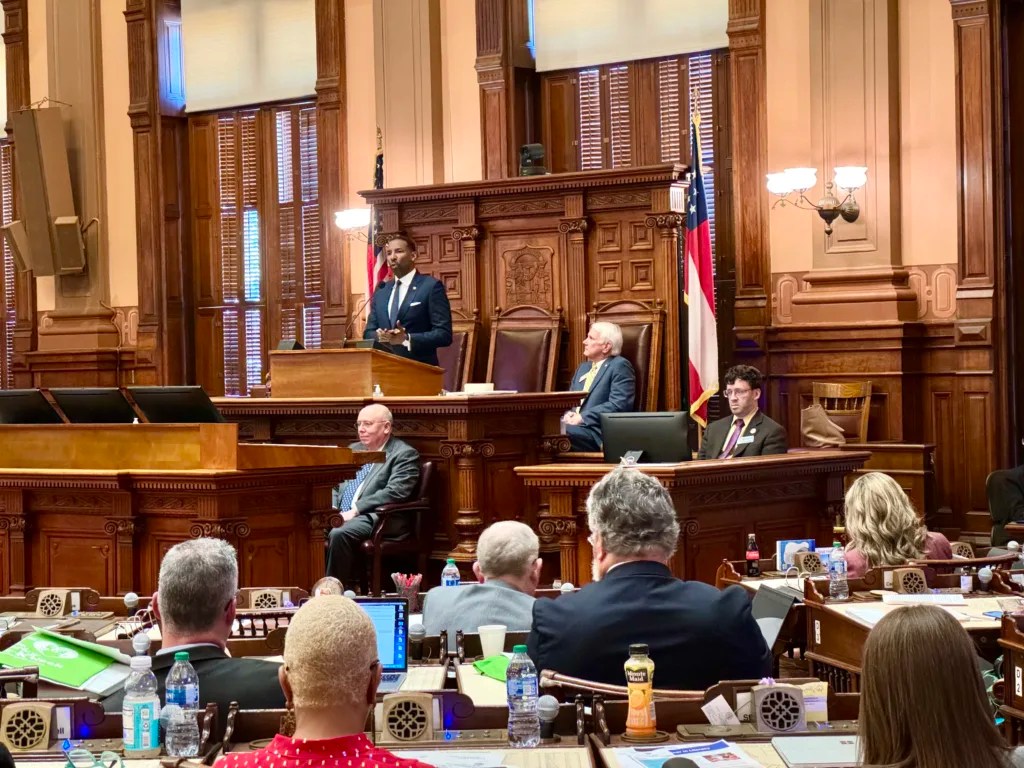Stay ahead of the curve as a political insider with deep policy analysis, daily briefings and policy-shaping tools.
Request a DemoRogue prosecutors, sanctuary cities, out-of-control events targeted by lawmakers

House speaker Jon Burns explains his support of a bill to empower a prosecutorial oversight commission. (Credit: Jill Jordan Sieder)
Georgia lawmakers took action this week to rein in what they view as rogue prosecuting attorneys and cities that act to protect undocumented immigrants. They also want to hold event organizers accountable for rowdy and costly gatherings, and bring back a public advocate to help keep power bills under control.
On Thursday the House approved its fiscal year 2025 budget, making modest changes to the governor’s proposed spending plan, and sent it to the Senate for review.
Disciplining prosecutors. After lengthy debate, the House voted 97-73 to pass Senate Bill 332, which creates rules to empower the new Prosecuting Attorneys Qualifications Commission to investigate, discipline and remove state prosecutors who, as Rep. Joseph Gullett, R-Dallas, put it, “abuse their office, sexually harass their employees and do not show up for work.”

Minority Whip Rep. Sam Park, D-Lawrenceville, said the bill “is a partisan attempt to control and discipline prosecutors who hand down decisions that Republican politicians do not like,” adding that the bill would “protect twice-impeached former President Donald Trump from criminal investigation.”
At a press conference after the vote, House speaker Jon Burns, R-Newington, said, “This is not about any one district attorney, any action or lack of action of any one district attorney in our state. But it is about ensuring that our district attorneys enforce the rule of law [and] keep our citizens safe in every jurisdiction they’re responsible for around our state.”
Meanwhile, a Senate special investigative committee launched its probe of alleged misconduct by Fulton County District Attorney Fani Willis, which Sen. Greg Dolezal, chief deputy whip in the Senate, said includes “the use of public funds and accusations of an unprofessional relationship.”
On Wednesday the committee, made up of six Republicans and three Democrats, called as its first witness Ashleigh Merchant, an attorney representing Michael Roman, a co-defendant of Trump in the election interference case. Merchant shared texts and other evidence from witnesses alleging that Willis had engaged in a romantic relationship with special prosecutor Nathan Wade that predated his hiring, and alleged that Wade had been overpaid for his work on the case while treating Willis to lavish trips to tropical locales.

Sen. Harold Jones, D-Augusta, the minority whip, questioned Merchant’s premise that the trips were either lavish or provided evidence of a conflict of interest that had hurt her client. “Your argument is a person who makes $200,000 a year is actually setting up prosecutions to go on a trip that costs $3,500?” he asked.
Here are some other highlights of the General Assembly’s work this week:
In the House
- Events that become nuisances. Senate Bill 443 would make the promoters and organizers of unpermitted events that cause property damage or force local governments to spend money on trash pickup, public safety or other costs to assume liability and pick up the tab. The bill was spurred by the annual Orange Crush spring break beach bash on Tybee Island, an unpermitted event which last year brought tens of thousands of college students to the island, and whose revelry reportedly cost the small city $187,000 and led to the arrest of 18 people. The House voted 163-4 to pass the bill. If the governor signs it, it will be just in time for the next Orange Crush event planned for April 19-21.
- Power to the people. The House is considering a Senate bill that would revive a watchdog position that could help bring down Georgia Power electricity bills. Senate Bill 457 would restore the Consumers’ Utility Counsel, a lawyer who would represent customer interests at the Georgia Public Service Commission, which regulates utilities. The bill’s sponsor, Sen. Chuck Hufstetler, R-Rome, said he filed the bill after the PSC approved a series of Georgia Power utility bill increases due to growing electricity costs associated with building the Vogtle nuclear power plant units.
- Medical marijuana bill returns. The House insisted on its version of a bill that would change how the state’s slow-to-grow medical marijuana program is regulated. House Bill 196, was bogged down in significant last-minute changes last session that caused the Senate to balk at passing it. The House tacked on a separate bill to regulate hemp products that most senators had never seen. The bill will now be hashed out in a conference committee with three representatives from both chambers.
The bill’s lead sponsor, Rep. Alan Powell, R-Hartwell, wants to abolish the Georgia Access to Medical Cannabis Commission and make the Department of Agriculture responsible for managing marijuana grower licenses and other related business. The commission was sharply criticized last year for its lack of transparency and its methodology for awarding licenses to companies that grow marijuana, which led nine growers whose bids were unsuccessful to sue the state. The proposed legislation would allow the agriculture commissioner to mediate the legal complaints and award new grower licenses to those whose operations are deemed meritorious, and the department’s work on cannabis would be subject to open meeting and open records laws.
- No jacked-up cars. Lawmakers said ‘no’ to the ‘Carolina Squat,’ an alteration to the front or rear suspension on a car, often a truck, that makes the front end ride higher than the back, as if the car is squatting. Rep. John Carson, R-Marietta, said SB 352, which makes it illegal to alter the suspension of a car so that one end of the frame is four inches higher or lower than the other end, is necessary for safety reasons. The squat modification creates “an effect on public safety of not having headlights or the driver’s eyes on the road,” he said. The bill passed 136-33.
In the Senate
This week, several Senate committees approved education-related house bills and legislation that would clamp down on sanctuary cities, as well as home invaders who remain in a dwelling and intend to commit family violence.
- Pressure mounting for sanctuary cities. The Senate Public Safety Committee hijacked a bill this week originally related to penalties for passing school buses to create a new law regarding sanctuary cities. The committee approved a new version of HB 301 that would impose more financial punishments on jurisdictions the state considers to have policies that protect undocumented immigrants in violation of state and federal law.
- Heart attack help. All schools would have automated external defibrillators and emergency action plans to deal with people experiencing cardiac arrest based on provisions in HB 874, which cleared The Senate Committee on Education and Youth this week.
- Funding for state charter school leaders. The Senate Committee on Education and Youth passed HB 1122 to provide funding for local and state charter school principals and superintendents. Further, this bill would increase opportunities for students to attend the public schools, including charter schools, where their parents or guardians work.
- Greater protection against domestic violence. The Senate Committee on Children & Families passed HB 509 which would expand the offense of burglary in the first degree or second degree to include entering or remaining at the dwelling of another with the intent to commit an act of family violence. The bill is intended to address domestic violence. For instance, if an ex-spouse breaks into the home, two crimes would be committed: criminal trespass and battery. If that person steals something, he or she is guilty of a felony because that’s considered burglary.
In other news

Atlanta Mayor Andre Dickens paid a visit to both the House and Senate on Thursday. In both chambers he noted the city’s partnership with state public safety agencies and touted the drop in violent crime rates in Atlanta, where major crimes against people were down 15%, and homicides were down by 21%, “the third-largest drop in homicides than any other city in the U.S.,” he said.
Dickens also discussed the city’s work to bring more affordable housing to Atlanta, particularly for the unsheltered, which he said was another shared priority with state leaders.
“My hope is we can keep open lines of communication going together between this House and my administration,” Dickens told lawmakers. “We’re all committed to making the best choices in the best interests of the people of this city and the people of the great state of Georgia. Thank you for welcoming me today and I want to stay in great partnership with the city and state.”
House speaker Jon Burns told Dickens, “This House believes in you on both sides of the aisle, and we look forward to continuing our partnership. As Atlanta goes, so does the state.”
The Georgia Legislative Black Caucus extended condolences Thursday in the death of Naomi Ruth Barber King, the sister-in-law of the late civil rights icon the Rev. Dr. Martin Luther King Jr. Ms. King died Thursday in Atlanta. She was 92. King was the wife of the late Rev. A.D. King and a civil rights activist and community leader.
“Her unwavering commitment to justice and equality extended beyond her activism, as she dedicated herself to uplifting her community through education, mentorship, and philanthropy,” caucus Chairman Carl Gilliard said in a statement.
Read these related stories:
Have questions? Contact Jill Jordan Sieder on X @journalistajill or at [email protected] and Tammy Joyner on X @lvjoyner or at [email protected].
And subscribe to State Affairs so you do not miss an update.
X @StateAffairsGA
Instagram@StateAffairsGA
Facebook @StateAffairsGA
LinkedIn @StateAffairs
Newly minted Senate Minority Leader Harold Jones II: ‘I’m not the typical back-slapping politician’
Nearly 10 years into legislative life, Sen. Harold Jones II wouldn’t change anything about the experience. “I love every minute of it. Even when I hate it, I love it,” the 55-year-old Augusta Democrat told State Affairs. Come January, Jones will add another role to his legislative duties: Senate minority leader, a job held for …
Gov. Kemp calls on state agencies to be fiscally restrained amid record $16.5B surplus
The Gist Gov. Brian Kemp asked the state’s 51 government agencies for continued fiscal restraint when drafting their amended fiscal year 2025 and 2026 budgets. Most agencies adhered to his request even as the state’s general fund surplus hit a record $16.5 billion last month. Forty-five agencies, excluding state courts, followed the governor’s instructions to …
Georgia defies bomb threats as election chief declares a “free, fair and fast” vote amid record turnout
ATLANTA – Despite dealing with over 60 bomb threats, Georgia’s election chief said Tuesday the state’s general election went smoothly. Georgia had a record turnout with nearly 5.3 million people voting, Secretary of State Brad Raffensperger told reporters. Election officials in the state’s 159 counties have until 5 p.m. to certify votes. “We had a …
In the (state)house: Meet the newest members of the Georgia legislature
When lawmakers reconvene at the state Capitol on Jan. 13, there’ll be a cadre of new faces in the 236-member Georgia General Assembly, one of the nation’s largest state legislatures. All 236 statehouse seats were up for election this year. Most candidates ran unopposed. Incumbents in contested races easily kept their seats, with the exception …



